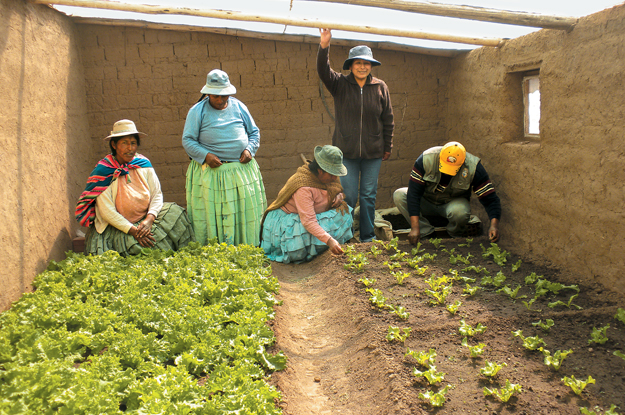Rosmery Mollo Mamani’s great-grandmother died in childbirth. It is an all-too-common tragedy in the Bolivian altiplano (plateau), where Indigenous women experience the country’s highest rates of maternal mortality. But Mollo refused to accept that fact as inevitable.
At the age of 19, she left her Indigenous community in the province of Ingavi to pursue a degree in nursing at La Universidad Católica Boliviana (Catholic University of Bolivia) in La Paz. For the past nine years, she has been the coordinator of the Warmi public health project—which, until it lost funding last year from the Corporación Andina de Fomento (Development Bank of Latin America—CAF), was one of Bolivia’s most successful efforts to reduce maternal mortality rates. Warmi, which means “woman” in Quechua and Aymara, has provided sexual and reproductive health counseling to at least 1,600 women and has also engaged many of these women’s husbands and partners in discussions about relationships and gender equality. In 2008, the Pan American Health Organization recognized Warmi’s contribution to women’s health and empowerment in Latin America.
Researchers have linked the high level of maternal deaths in rural areas to a lack of education, limited access to health services and cultural barriers.
Mollo, who is Aymara—Bolivia’s second largest Indigenous group after the Quechua—recalls that some of the strongest resistance to Warmi’s work came from her own community. “Speaking about [sexual and reproductive health] is not proper, it is not done,” she says.
In 2004, Save the Children Bolivia selected then-28-year-old Mollo to be the lead coordinator of the Warmi project in Calamarca, a municipality 20 miles (32 km) south of La Paz. There, she focused on the link between sexual health and participation in the public sphere.
Before the start of the Warmi program, Mollo described Calamarca as “empty,” as if no women lived there at all. The truth is, the women were so consumed with household responsibilities that they rarely left their homes.
Mollo’s conversations and workshops gradually persuaded women to leave their houses, even for a short time, and to engage with others. “They learned they had the right to relax,” she recalls.
Eventually, the women became prime movers in groups that addressed local issues, such as the lack of vegetables in the winter months. They constructed greenhouses and cultivated food for both personal consumption and sale.
One big step toward change came in the monthly group meetings Mollo organized, which discussed previously taboo topics like the reproductive system, sexually transmitted infections, self-esteem and negotiation, and domestic violence. Gradually, the women became more familiar with their bodies and learned when to seek medical attention.
Mollo was disappointed when she learned last year that Warmi’s 10-year contract would not be renewed, but that hasn’t prevented her from continuing her work. She regularly checks in on the women she met to support their initiatives.
“I taught the women to love, respect and value themselves, and care for their bodies,” says Mollo, who hopes her two daughters, ages 19 and 9, will be part of a more self-aware generation of Indigenous women. “If we don’t learn to love ourselves, how will we be able to love and care for others?”
Even the men began to get it. “The men used to hate me and tell me not to talk to their wives, but now I greet them with joy,” she says. “When you speak to them scientifically, they understand.”





